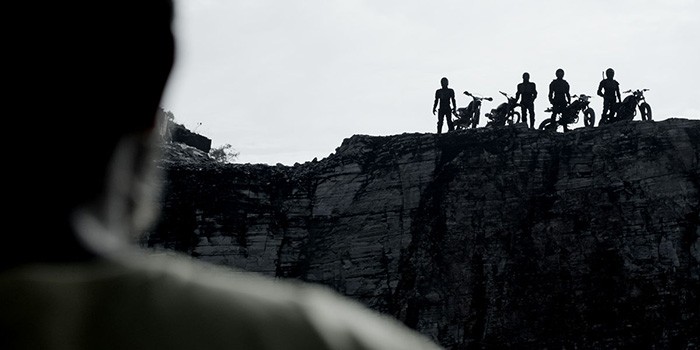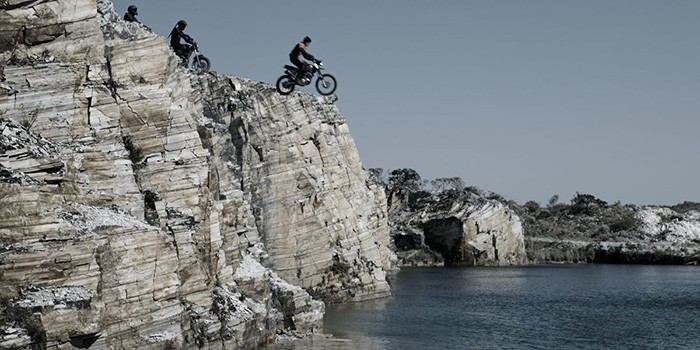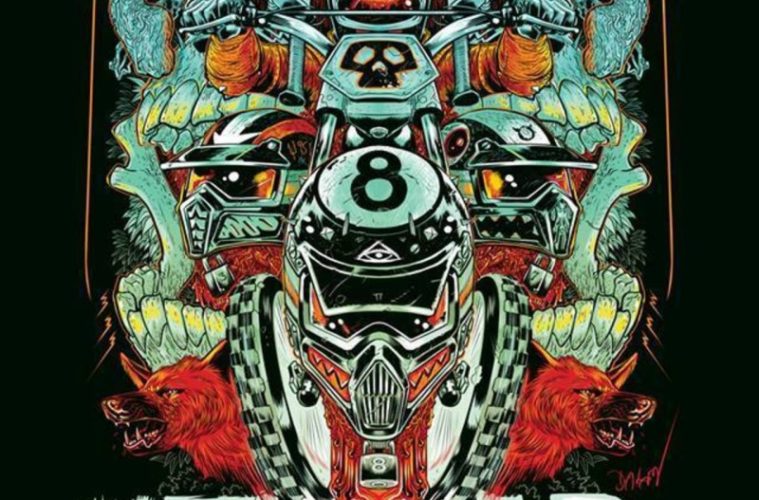You won’t find a better locale for a film than Serra da Canastra in Minas Gerais, Brazil. Its rocky landscapes and serene hills are gorgeous, their quiet solemnity a perfect contrast to the loud gas-guzzling motorcycles director Vicente Amorim has roaming their dirt paths in Motorrad. The only other man-made objects found are constructions out of flat stones — an isolated home or ancient wall that shouldn’t be where it’s found. The same stones line the shores of calm lakes with which to let off steam: the main reason this group of six riders have come so far from their home on a beautifully sunny day. But this desire to live free comes at a cost once a random quartet of stalkers arrives to kill them one by one.

The result is an interesting film steeped in ambiguity and metaphor that I’m not sure resonates without research into the filmmakers’ motivations. If you read Amorium’s notes you’ll discover he’s made a movie about slaying personal demons and ghosts to discover one’s identity removed from the surrounding noise. He (and by association screenwriter L.G. Bayão and character creator Danilo Beyruth) has positioned his lead Hugo (Guilherme Prates) in a place where his yearning to be included with his brother’s friends has taken over his life. This young man is dabbling with theft to be appreciated as more useful, compromising ideals to be “seen.” And it’s as though something acknowledges this attitude. Something feeds it in order to show him there’s more to life than being someone you’re not.
Had I not read this message of intent, however, the metaphor would have been lost on me. Only the ambiguity would remain, this feeling that something’s happening not of this world. But even that’s hard to embrace when assumptions Amorium seems keen to force upon us are either ignored for too long or proven wrong. Rather than work towards an answer, the whole appears to be a generic horror with monsters devoid of purpose. The mystery surrounding Paula (Carla Salle) — a woman who catches Hugo stealing and lets him go with his spoils only to meet him again down the road — gradually disappears until she’s “one of the guys.” It doesn’t help that few truly question her involvement, her potential importance evaporating once she becomes another possible victim.

To me this is Motorrad: a superficial cat and mouse chase for survival. Hugo, his brother Ricardo (Emilio Dantas), his friends Rafa (Rodrigo Vidigal), Bia (Juliana Lohmann), and Maurício (Alex Nader), and Maurício’s buddy Tomás (Pablo Sanábio) hoped to enjoy a good time at Green Falls before Paula crosses their path with a detour she thinks they’ll love. They jump into the destination’s lake — except Hugo — and bask in the comfort of the cool water and warm sun. A warning not to drink comes and goes without elaboration. Maurício and Tomás are found missing. And the predatory bikers clad in black with machetes in hand arrive to show their homicidal strength. Unable to return to the wall they snuck through, they soon become desperate to find cover.
Tensions rise as these nameless villains pursue them — high enough that some of Ricardo’s bike gang selfishly turn on each other for survival too. Deaths come in the form of drowning, burning, and decapitation. Suspense increases with the darkening sky and lack of light. And more and more mysteries pop up without a shred of hint as to their meaning. What is up with Hugo’s hand? What’s going on with the weird well? Who are these bikers after? What does Paula actually know? Does any of it matter? Except for Amorium’s statement I would have said no. I would have said the whole is merely death and destruction without any rhyme or reason — something that wouldn’t warrant my recommendation to anyone who isn’t a die-hard graphic violence fan.

The question then becomes whether I can recommend it knowing Amorium’s motivations. Frankly, it’s still not nearly enough. Because even with this metaphorical war that I guess renders everything onscreen as the hallucinatory nightmare of Hugo (Does it?), too much is left unsaid. The constant desire on Amorium’s part to imbue a sense of dread and otherworldliness — look at the old man at the junkyard (Jayme del Cueto) for whom it’s impossible to decipher whether he’s wasted, simple, or just ominous atmosphere — falls flat because there’s nothing underneath the surface sheen. And no matter how beautiful the landscapes or the lighting that uses floating dust as high contrast film grain (this would look great in black and white), I never felt anything beyond excitement for the next death.
That might sound morbid, but there’s little else without investment in the supposed metaphor shrouding its dark adventure towards oblivion with mystery. Nobody seems truly broken up about anyone’s death and if this were actually all about Hugo he wouldn’t disappear for almost twenty-minutes at one point. So is everyone fighting his/her ghosts? Are they all unworthy of victory? It’s not like they’re doing a good job staying alive. The only reason Hugo is still standing after many scuffles is because the bikers don’t seem particularly interested in him. So maybe it’s not about conquering demons as much as letting them consume you. Maybe they’re toying with Hugo to isolate him and say he’s the reason everyone is dead. If that happened it would have finally made sense.
Motorrad premiered at the Toronto International Film Festival.

